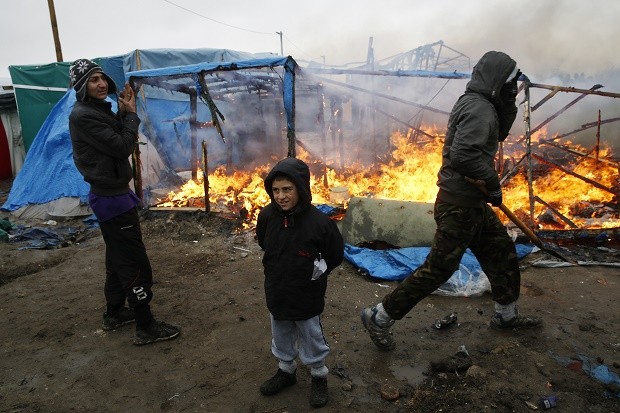France razes migrant camp as Greece seeks EU aid

Migrants stand in front of a burning dwelling in a makeshift migrants camp near Calais, France, Tuesday March 1, 2016. The source of the fire is not known. French authorities have begun dismantling part of the sprawling camp locally referred to as “the jungle” where thousands are hanging out, hoping to make their way to a better life in Britain. AP
CALAIS, France — Demolition workers tore down more makeshift shelters in France’s grim “Jungle” migrant camp Tuesday, as Greece pleaded for EU aid to help shelter thousands of refugees stuck in misery at its border.
In the northern French port city of Calais, tensions were high as officials for a second day razed part of the Jungle camp, which has become a magnet for people hoping to reach Britain.
Some sat on the roofs of their shacks, covered in blankets against the driving rain and freezing wind in a bid to stop their temporary homes from being pulled apart.
READ: Greece pulls Austria envoy as migrant crisis nears breaking point | Migrants expelled from Greek camp after protest
Officials tried to convince inhabitants to leave voluntarily and move to better accommodation provided for them, but many refused, fearing it will take them further from their goal of reaching Britain.
Article continues after this advertisementThere was no repeat of the violent clashes that erupted on Monday, but some remained defiant in the face of the bulldozers.
Article continues after this advertisement“We have already seen prison and torture, this doesn’t scare us,” a migrant told one of the teams.
Officials say the demolition will affect between 800 and 1,000 people, although charities working there say there are more than 3,450 people in the southern half of the camp, including 300 unaccompanied children.
One Sudanese migrant, Nureen, watched as the destruction moved gradually towards his makeshift home. He had been told to leave by Wednesday morning.
“Unfortunately, we cannot fight the police,” he said. “There is nothing for us to do. We will just be left in the cold winter.”
Greek misery
The late winter freeze brought similar misery to Greece’s border with Macedonia, the latest flashpoint in Europe’s worst migration crisis since World War II, which many fear poses a threat to the very core of the European project.
Athens said Tuesday it had requested nearly half a billion euros in emergency funds from the European Union to help shelter 100,000 refugees.
More than 7,000 people have been stuck on the border after Balkan states imposed a tight daily limit on the number of migrants allowed to enter.
Bleak scenes saw the refugees stranded in mud-soaked fields and fighting over food distributed from the back of a van.
“We have been waiting for six days,” said Farah, a 32-year-old Syrian, as a van distributing canned food and long-life milk was quickly mobbed and emptied in minutes.
“The food is not enough, everyone is lying to us and we are desperate,” she said.
The grim situation has sparked growing criticism of countries that have capped the number of migrants they are willing to let in, under the strain of a flood of people fleeing poverty and conflict in Africa and the Middle East — notably Syria.
Top NATO General Philip Breedlove said the crisis was playing into the hands of Russia by destabilising Europe, accusing the Syrian regime and its ally Moscow of “deliberately weaponising migration in an attempt to overwhelm European structures and break European resolve”.
The UN said over 131,000 migrants had crossed the Mediterranean to reach Europe so far this year, more than the total number for the first five months of 2015.
EU chief on crisis tour
The EU lashed out at Macedonian police for tear-gassing desperate refugees who tried to force their way across the border with Greece on Monday, saying it was “not our idea of managing the crisis”.
Despite the criticism, countries in the firing line were standing firm.
“We cannot take in hundreds of thousands of people. We are not Germany’s waiting room,” Austrian Chancellor Werner Faymann told the Heute newspaper.
“It cannot be that people are just waved through Greece, Macedonia and Croatia and that Austria does the EU’s job of sharing them around.”
Macedonia said it would stepping up troop numbers on the border
In a bid to ease the deep divisions over the crisis, EU president Donald Tusk set off Tuesday on a tour taking him to Vienna and the Balkan states, as well as Turkey, the main departure point for refugees, where he will press for “a more intensive engagement” from the government.
Germany, which registered 1.1 million migrants in 2015, said it had reached an agreement with Tunisia to speed up the repatriation of rejected asylum-seekers from the North African country, which it considers safe.
And 308 migrants — mostly from Morocco, Tunisia and Algeria — are being sent back to Turkey by Wednesday under a deal signed between the two countries in 2002, according to a source in the citizens’ protection ministry.